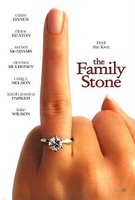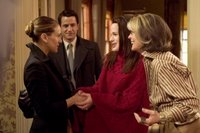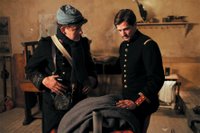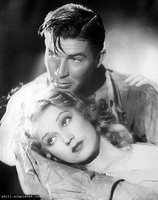 The Family Stone (2005)
The Family Stone (2005)
 Everybody hates her. And they show exactly what they feel.
Everybody hates her. And they show exactly what they feel.The romantic dramedy The Family Stone is about a family befitting its family name. Stubborn, opinionated, strong individuals. These are what characterize members of the household that the uptight, obsessive compulsive Meredith Morton (Sarah Jessica Parker) meets during Christmas. She and boyfriend Everett (Dermott Mulroney) are set to announce their engagement but queer and quirky little things start happening around Meredith that family "gangs" up on her.

Most vocal of her vehement dislike for Meredith is Everett's youngest sister Amy (Rachel McAdams) whose sarcasm and meanness knows no equal. Then comes Everett's deaf brother Thad (Tyrone Giordano) who is in a relationship with a gay partner. Being conservative and orthodox, this doesn't sit well with Meredith and her parochial view on homosexual relationships and racial issues are challenged by the family. Even Everett's mom Sybil (Diane Keaton) does not hide her frustration with Meredith and there is no way she is giving her her mother's wedding ring as she has promised to Everett.

The only ally that Meredith has is Everett's playboy brother Ben (Luke Wilson) who shows real concern and compassion towards Meredith's uneasy situation. Things get more heated and emotional when Meredith asks her younger sister Julie (Claire Danes) to accompany her in the Stone home.

The movie manages to discuss sensitive issues on homosexuality, adoption in mixed-marriage, death of a family member, sex and infidelity with a candid verve and honesty. It does not pander on the melodrama or too easily give in to formulaic endings as many Hollywood movies are wont to. The values of deep respect, acceptance, asking for forgiveness and letting go make the movie truly enjoyable and satisfying to watch. This movie is perfect for this Christmas.
 The fanatic verdict: go and watch it!!!
The fanatic verdict: go and watch it!!!






































